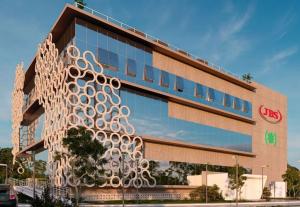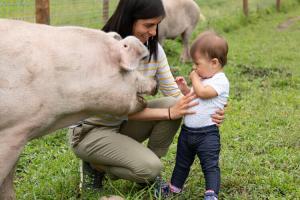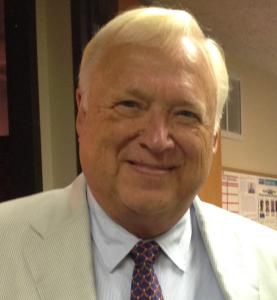Switching to No-Kill Cultured Meat? Part 9.

Eating meat nourishes us. But, in time, it will killl us. Why is meat-eating deadly? Because current methods of meat production overheat our planet through deforestation, methane emission, and atmospheric warming. To say nothing of the animal suffering. Might no-kill cultured meat provide nourishment without such danger to our climate? Let’s look.
Climate: Grilling the world’s biggest meat producer
“Climate: Grilling the world’s biggest meat producer.” That’s the title of a September 28, 2023 New York Times article written by David Gelles with Manuela Andreoni.
What is sizzling on the grill? JBS, the world’s largest meat producer. JBS was founded by José Batista Sobrinho in Brazil. On the website for JBS USA, the majority owner of Pilgrim’s Pride and other businesses, JBS touts the “capacity” to “process more than 200,000 cattle, 500,000 hogs, 45 million chickens and 80,000 small stock (lambs, sheep, goats and veal calves) per week,” even though JBS does not disclose the actual number of “processed” animals. Each year JBS puts 32 billion pounds of animal products on the market. Annual revenue? $50 billion.
 Does JBS have an environmental impact? You betcha. Perhaps 90% of Amazon deforestation is linked to the cattle industry. Carbon and methane emissions by JBS are staggerling, according to the Institute for Agriculture & Trade Policy. “Tropical deforestation for meat production is a double whammy for the climate, replacing biodiverse carbon sinks with clear-cut land full of methane-belching bovines,” says Gelles.
Does JBS have an environmental impact? You betcha. Perhaps 90% of Amazon deforestation is linked to the cattle industry. Carbon and methane emissions by JBS are staggerling, according to the Institute for Agriculture & Trade Policy. “Tropical deforestation for meat production is a double whammy for the climate, replacing biodiverse carbon sinks with clear-cut land full of methane-belching bovines,” says Gelles.
JBS is only one slice of the earth roast. Those of us who eat burgers and chicken wings will gradually become as hot as the meat we chew on.
What about No-Kill Cultured Meat?
Breaking news: JBS is investing $62 million to start work on Brazil’s first no-kill cultivated protein research center. Where might this lead?
Along with my student colleague Brian Brozovic, over the last year I have been inviting global gustation of no-kill cultivated meat. Oh, yes, it’s still in the research stage. But, no-kill cultured meat is beyond jejune. It’s about to mature. Etable products are starting to appear on the market and even restaurants.
Here are some questions that might lead to encouraging answers for our planet’s future.
- How might we increase availability of low-cost protein to the world’s poor who lack a healthy diet?
- How might we tantalize the taste buds of the world’s affluent with new protein delicacies that will reduce their consumption of burgers, steaks, chops, and Kentucky Fried Chicken?
- How might we meet the demand for meat with a supply that virtually eliminates the slaughtering of beef cattle and chicken factory farms?
- How might vegetarian and vegan diets up their animal-based protein without the suffering of animals?
- How might animal rights advocates win a victory on behalf of nonhuman sentient creatures?
- How might we reduce if not eliminate carbon and methane emissions from animals in the food chain?
On our horizon watch for the breathtaking advance in food technology we call: no-kill cultured meat. Celular based meat products may require little or no animal sources. Can you believe it? Delicious and nutricious meat withhout the need of slaughtering an animal to obtain roasts, steaks or chops. To initiate cellular based meat production a cell colony requires only one animal’s tissue. No harm is done to the animal in most cases.
This new technology is known by a variety of labels: Cell/cellular based meat, cultivated meat, Cultured meat, in vitro cell cultures, alternative meat and lab-grown meat.
Conclusion
 What are the religious implications of no-kill cultivated meat technology? Brian and I have asked the question: will adherents to our traditional religions welcome lab grown meat into their recommended diets? Or, might we find resistance? Nuance? Conditional acceptance? Answers appear in a series of articles and Patheos posts.
What are the religious implications of no-kill cultivated meat technology? Brian and I have asked the question: will adherents to our traditional religions welcome lab grown meat into their recommended diets? Or, might we find resistance? Nuance? Conditional acceptance? Answers appear in a series of articles and Patheos posts.
Can we imagine only a few decades into the future when our children will look astonished when we tell them that their forebearers used to kill animals in order to eat meat?
To taste the no-kill cultured meat discussion, try these.
To Eat No-Kill Cultivated Meat. Part One: The Science
To Eat No-Kill Cultivated Meat. Part Two: Kosher?
To Eat No-Kill Cultivated Meat. Part Three: Hindus? Jains?
To Eat No-Kill Cultivated Meat. Part Five: Muslim?
To Eat No-Kill Cultivated Meat. Part Six: Catholic?
To Eat No-Kill Cultivated Meat. Part Seven: Christian Vegetarian?
To Eat No-Kill Cultivated Meat. Part Eight: Food Theology?
SR 2034. Switching to No-Kill Cultured Meat? Part 9.
▓
 Ted Peters (Ph.D., University of Chicago) is a public theologian directing traffic at the intersection of science, religion, and ethics. Peters is an emeritus professor at the Graduate Theological Union, where he co-edits the journal, Theology and Science, on behalf of the Center for Theology and the Natural Sciences, in Berkeley, California, USA. He recently co-edited Astrobiology: Science, Ethics, and Public Policy (Scrivener 2021) as well as Astrotheology: Science and Theology Meet Extraterrestrial Intelligence (Cascade 2018). He also co-edited Religious Transhumanism and Its Critics (Lexington 2022) and The CRISPR Revolution in Science, Ethics, and Religion (Praeger 2023). Peters is author of Playing God: Genetic Determinism and Human Freedom (Routledge, 2nd ed, 2002) and The Stem Cell Debate (Fortress 2007). See his website [TedsTimelyTake.com].
Ted Peters (Ph.D., University of Chicago) is a public theologian directing traffic at the intersection of science, religion, and ethics. Peters is an emeritus professor at the Graduate Theological Union, where he co-edits the journal, Theology and Science, on behalf of the Center for Theology and the Natural Sciences, in Berkeley, California, USA. He recently co-edited Astrobiology: Science, Ethics, and Public Policy (Scrivener 2021) as well as Astrotheology: Science and Theology Meet Extraterrestrial Intelligence (Cascade 2018). He also co-edited Religious Transhumanism and Its Critics (Lexington 2022) and The CRISPR Revolution in Science, Ethics, and Religion (Praeger 2023). Peters is author of Playing God: Genetic Determinism and Human Freedom (Routledge, 2nd ed, 2002) and The Stem Cell Debate (Fortress 2007). See his website [TedsTimelyTake.com].
▓














